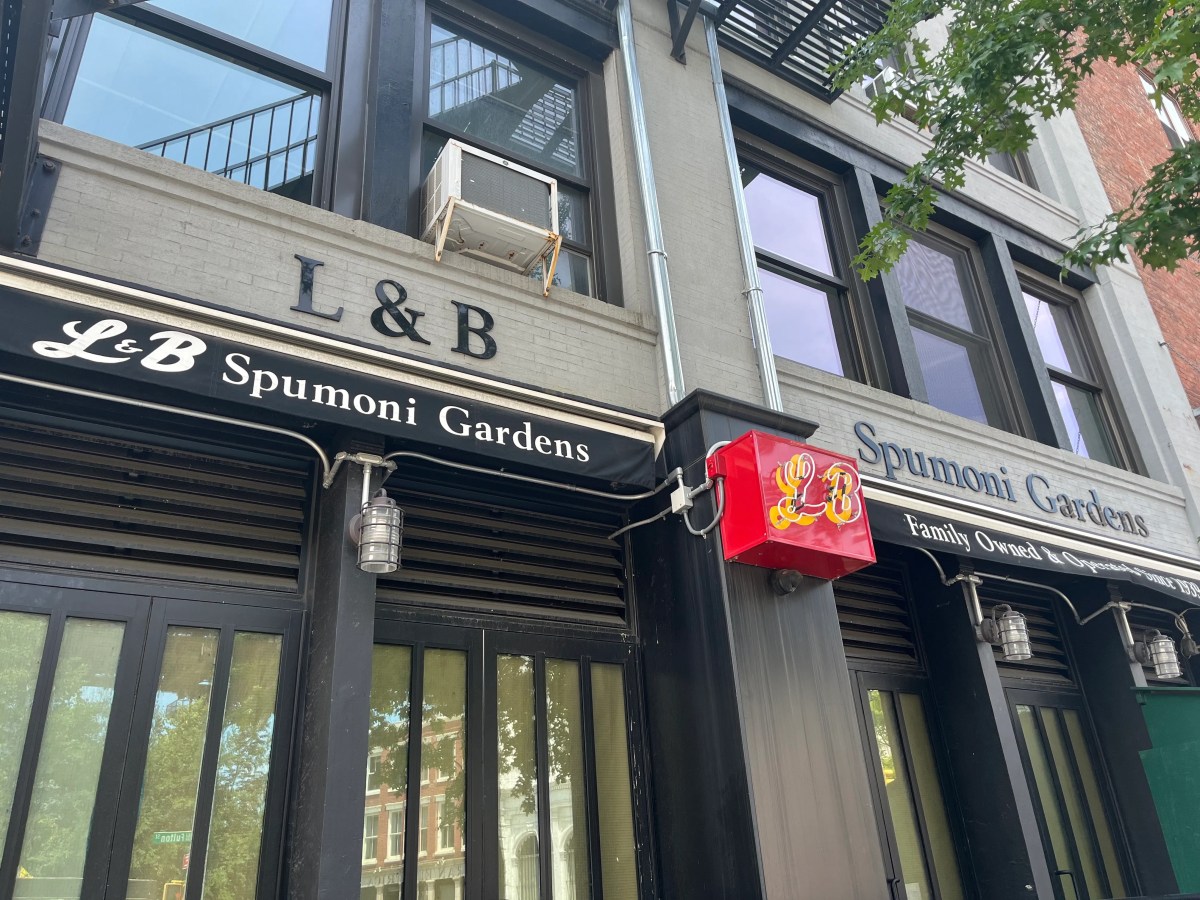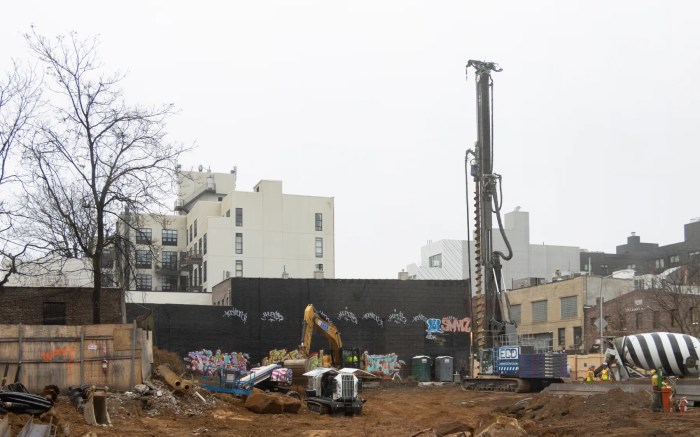By David H. Ellis
Valerie Wang can’t sleep.
Forget work stress, a cramped apartment or a neighbor with a high-wattage stereo system.
Instead, for Wang, the problem is an unfinished wooden roof deck outside her window where large-leaf palm trees surround a pool filled with brilliant orange goldfish.
This picturesque scene, which might sound like an enjoyable respite from grueling urban life, also serves as the rooftop bar for the recently opened Delancey Bar at 168 Delancey St. According to Wang, it has been nothing but an irritant for her and nearly two dozen other residents living on Clinton and Attorney Sts., some of whom do not speak English.
“It wakes me up — it’s literally 2 feet away from my window,” said Wang from her second-floor apartment on Clinton St.
Alexandra Drozd sees the situation differently. As the owner of the Delancey, which opened two months ago, and the Red and Black bar in Williamsburg, she says that she has responded to residents’ concerns by installing sound-dampening blankets and ensuring that patrons leave the roof by 11:30 p.m. during the workweek and no later than 1:30 a.m. on weekends.
“The thing is, everybody who has ever approached me with a problem, I try to take care of it as soon as we could,” said Drozd. “I understand people have to live their life.”
Clashes between residents and businesses are not unusual in city living. Yet, what lingers in the case of the Delancey and similar establishments located across the city is an uncertainty over the legal hours of operation for rooftop decks. In fact, an examination of the issue by The Villager reveals that both rooftop bars and backyard gardens are only regulated by their liquor licenses, potentially leaving adjacent residents at the mercy of bar and nightclub owners.
On a recent weekend evening after midnight, hopeful customers with torn T-shirts and prominently displayed tattoos lingered beneath the second-floor roof deck of the Delancey, basking in the yellowish glow of the Williamsburg Bridge’s street lamps. With the sound of traffic in the background, it is understandable that only the residents living above the roof deck to the north, east and west might know how boisterous the crowd was that night.
Approximately 150 miles away, in his office in Albany, Mark Anderson, the deputy commissioner of administration for the State Liquor Authority, confirmed that the Delancey is only required to follow Alcohol Beverage Control laws in New York City, which mandates that bars close from 4 a.m. until 8 a.m. Monday through Saturday and until noon on Sundays.
“We don’t have any specific hours restricting roof service; that’s up to local jurisdictions,” says Anderson.
Separate interviews with the city’s Department of Consumer Affairs and the Department of Buildings found that neither agency is responsible for oversight of this uncounted number of rooftop bars across the city.
Since most of these settings are located on private property, many of these bars are left unfettered from the same rules that limit the operation of sidewalk cafes, with noise complaints by neighbors as the only system of checks and balances against rowdy patrons. Even though the Department of Environmental Protection normally investigates noise complaints, penalizing this infraction is difficult, which complicates the oversight of these bars, said Judy Duffy, assistant district manager of Community Board 1, which covers Lower Manhattan.
“Noise is one of the hardest things to get violations on because it doesn’t leave any evidence,” said Duffy. “You have to catch them in the act.”
Art Strickler, district manager of Community Board 2, which covers Greenwich Village, Soho and the Meatpacking District, areas saturated with nightlife, indicates that these establishments have been neglected for quite some time in many of the neighborhoods he oversees. Even though efforts by his fellow board members to introduce regulations for these rooftop bars have failed, he believes that they should follow the same rules as restaurant sidewalk cafes, which are required to close at midnight on weeknights and 1 a.m. on the weekends. Legally, bars such as the Delancey can currently keep their roofs open until 4 a.m.
“As far as I know there are no regulations on rooftops and backyards,” said Strickler. “As long as they follow Buildings regulations, you can have a candy store open night and day — the only regulation is liquor.”
Jo Addy, a spokesperson for Soho House, a private members club located at 29-35 Ninth Ave., said that even though they boast a pool, hammocks and a bar, their roof is closed to patrons after midnight. Addy said that even though the downstairs bar is open until 4 a.m., drinks are only served on the roof until 11:30 p.m.
“We like to keep friendly with neighbors,” said Addy, noting the club’s decision to consider the adjacent, albeit small residential population.
Some residents have scoffed at Wang’s claims about excessive noise and her petition to Community Board 3 to clear the bar’s rooftop at 11 p.m. on weeknights and midnight on the weekends. Other neighbors of the Delancey, such as Edwin Morris, have even been impressed with what he called the bar’s “unusual willingness” to work with neighbors. Nevertheless, Alexandra Militano, the chairperson of Board 3’s S.L.A. Committee, indicated that they were fearful of this situation when her fellow committee members voted to deny the bar’s liquor license.
“The fact of the matter is that we told them the rooftop was not a good thing for that building or the neighborhood,” said Militano. “But the S.L.A. granted it anyway.”
According to Militano, the problem with the Delancey stems from the S.L.A.’s lax policy of issuing liquor licenses and ineffective enforcement.
“Usually we try to get applicants to agree to restrict their hours of operation, because we know it will know have an effect on the residents,” said Militano. “Unfortunately, the State Liquor Authority doesn’t enforce those agreements, so there’s no way to penalize anybody who is in violation.”
Even though the dispute between Wang and the Delancey’s management seems to be at an impasse, Mark Stein, a member of Board 3’s S.L.A. Committee, believes that the deck is nevertheless a problem.
“With these old tenement buildings, it’s like an echo chamber and any noise is magnified,” Stein said. “It’s torturing these people day and night.”







































